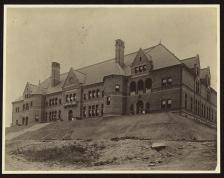Guest blogger Mark Hudson of Monroeville, Pennsylvania, here comments on the first Carnegie Library to drop the word «library» in its name.
(The very strong privately funded Carnegie Library tradition of the 19th and the beginning of the 20th century even inspired the Norwegian library pioneer Haakon Nyhuus. The Grünerløkka branch of Deichmanske bibliotek in Oslo (1914) is said to be the most carnegiish library building in Norway).
We’ve witnessed the phenomenon over the past few decades of library schools dropping the word “library» from their names and becoming «i-schools.» But I think this is the first example I’ve seen of a public library actually dropping the word “library» from its name.
The institution described in the article in Pittsburgh Post-Gazette, January 3, 2016 has always been multi-use, as are many public libraries in the U.S. and Canada. But it appears in this case that the “library» component has been completely relegated to the margins of what is now primarily a technology education center, concert hall and fee-based athletic club. Although the trend toward turning libraries into “tech centers» is widespread, most institutions calling themselves “libraries” continue to call themselves that. This story may be an indicator of more far-reaching changes to come.
I live in the Pittsburgh metro area and am familiar with the history, so here’s some background not mentioned in the article: The board of the former Carnegie Library of Homestead (now just «Carnegie of Homestead») summarily fired its MLS-degreed librarians several years ago. Then, as the article states, «Board members and volunteers stepped up to help manage the facility.” The question is never raised in the article as to whether there are (or were in the past) any professionally educated — i.e., MLS-degreed — librarians working at the Carnegie Not-Library of Homestead. But the article does blandly inform us that the current director «joined the board in 2010 and became full-time director of administration in 2012” and that her previous experience «included managing an art department and a call center for a manufacturing business.”
I think what’s most striking about the «Carnegie of Homestead» approach (and the “library as tech center” philosophy generally) is that the educational programs offered seem to be exclusively (not just “especially” as the article states) technology-oriented. Not history, not discussions of critical social issues or media literacy programs to increase public engagement and participation — just iPads, 3-D printers and robotics projects, because that’s what corporations are interested in funding.
All the concern about privatization seems rather naive when librarians are already giving profit-driven corporations this much influence over library programs and services.
